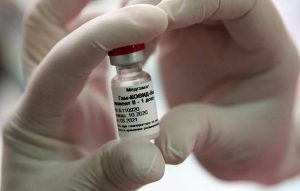
This might be a distinction without a difference, but it boils down to what you call how one influences the media and public opinion.
Pfizer’s coronavirus vaccine, having rolled out in the United Kingdom last week and rolling out in the U.S. today, is dominating Western news cycles. Who’s getting it and how it’s getting there, as well as who’ll take it when offered are leading topics in the U.S. and Europe.
But in Africa, the vaccine name on most people’s lips is Sputnik V, the shot developed by Russia with minimal testing before being widely distributed in Russia and on the African continent. While Pfizer’s vaccine was thoroughly vetted through an accepted clinical methodology that saw tens of thousands of doses given to a broad range of citizens in the U.K. and U.S., Sputnik V was given to just 76 persons in two hospitals before going into mass production and distribution.
As they say, perception is reality:
Curiously, in early November — before Pfizer’s announcement — Russia’s Sputnik V was the vaccine with the second-highest proportion of positive quotes about vaccine development. From the day Russia first announced its vaccine on August 11 to Pfizer’s announcement of its own vaccine’s efficacy on November 9, African media coverage of Sputnik V was largely positive (56 percent). After Pfizer, Moderna, and Oxford-AstraZeneca released their clinical trials’ findings, these vaccines surpassed Sputnik V in positive media perception. However, the Sputnik V vaccine remains the most discussed vaccine in African media and boasts the second-lowest negative perception (11 percent).
That quote is from a guest post on the Council of Foreign Relations blog by Beach Gray, PhD, and Neil Edwards, both analysts at Novetta, a media monitoring and analysis company focused on Africa. Gray and Edwards seem to use “public relations” and “disinformation” interchangeably, though the terms are far from the same thing:
Non-Russian media’s support for the Sputnik V vaccine and its clinical trials originates in large part from a targeted Russian disinformation campaign in countries with former and current ties to Russia and the Soviet Union. … Sputnik V seems to be as much about public relations and Russian soft power as about stopping the spread of COVID-19.
Even the name of the Russian vaccine was selected for its brand power. Sputnik was the first satellite launched into earth orbit in 1959. So not only was the word familiar, it also represents a time when Russia — then the Soviet Union — was well ahead of the United States and the rest of the world in the nascent space race. The name implies that Russia’s vaccine is better because it was available nearly three months before Pfizer’s.
While we PR professionals are trained to avoid absolute superlatives, the Russians suffer no similar contraints, with the Russian Health Ministry calling Sputnik V “the best vaccine in the world” against COVID-19. Despite that hyperbole, the campaign has the earmarks of an effective public relations effort:
To shape the global discussion of Sputnik V, Russia used a familiar tactic: publish breaking stories that will be widely covered in international media. Russia’s Ministry of Health, unconstrained by international scientific standards, claimed the vaccine’s overwhelming effectiveness. The Russian government then used such flimsy data to back up proclamations that governments worldwide had expressed interest in the Sputnik V vaccine. With its messaging, Russia specifically targeted countries — such as Mozambique, Nigeria, and South Africa — where it competes with Western and Chinese influence. To underline the vaccine’s apparent efficacy, the Russian News Agency stated that as of December 2, one hundred thousand high-risk individuals had already received Sputnik V vaccinations in Russia. (emphasis added)
Russian President Vladimir Putin personally announced the release of Sputnik V, and as a result, 89% of articles about the vaccine in the African press quoted him. Putin’s vaunted cult of personality was employed to hype the vaccine — he even talked about his adult daughter receiving a dose.
None of these tactics — placing articles in media, naming a product after an established brand, employing celebrities as spokespersons — lie outside the practice of public relations. Where they meld into disinformation — the authors seem to imply — is when the article placements are in state-owned and -run media, the product name connotes Russian superiority and the celebrity spokesperson is Russia’s head of state.
Sputnik V’s popularity in African media is troubling, considering the vaccine has not undergone the same rigorous clinical trials as other contenders. The success of Russia’s disinformation and public relations strategy stems from the Kremlin’s ability — and willingness — to disseminate and emphasize its message about Sputnik V’s effectiveness.
The authors’ solution? Combat the PR and disfinformation with experts emphasizing science and the value of stringent clinical testing. However, as Russia continues its real-world trials on hundreds of thousands of Russians and Africans, it would seem that approach will be as effective as closing the barn door after the mule got loose.
